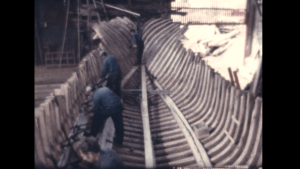
Construcción artesanal de barcos en los astilleros de Lekeitio.
Handcrafted construction of ships in the shipyards of Lekeitio.
Jami is a black-and-white film about beautiful girls that are actually the International Playboys, a well known singing and dancing group of three young men, in seven minutes, Larry Zazelenchuk of Sudbury, Ontario, shows us how the boys make-up to be some of the prettiest girls you have ever seen. In their conversation during make-up in the dressing room the boys leave no doubt about the fact this is not another film about homosexuals. This is strictly show business, well filmed and, certainly, an unusual subject,"PSA Journal, Mar. 1970, 43-44.

"Jamie which won the PSA-MPD Gold Medal for the best film in the Festival, the MPD Scenario Film Award, and the MPD Golden Scissors Award (for the best film editing) is an 18-minute black-and-white 16mm film with sound on magnetic stripe. It is a Civil War drama of a young Union bugler's act of kindness toward a wounded Confederate and the tragic consequences. Approximately 1500 feet of film were exposed, this being boiled down to the final 630 feet. Klobukowski spent a year on the picture, from its original concept through the writing, scripting, obtaining uniforms, shooting, editing, and finally adding the sound. The latter is all original, the music being especially composed for the film by Paul Bentzen and played by students and staff of Wisconsin State University at Stevens Point. Location areas were wooded sections around Stevens Point, Custer, and West Best, Wisconsin. Participants in the battle scenes were members of the North-South Skirmish Association, and the costumes were either originals or exact replicas furnished by members of that organization" PSA Journal, Sept. 1966, 34.
"The film begins at a women's hairdressers. The manager asks one of the hairdressers to dinner that evening but she refuses as she has a customer, Mrs Blowers, who requires longer visits. At this the manager appoints Jane, a fellow hairdresser to take the appointment. Jane looks at the portrait of her fiance. We follow as the portrait dissolves into the real man. He works with cars and is informed that he has lost his job. Back at the hairdressers and Mrs Blowers arrives for her appointment. What starts as 'just a trim' becomes a longer matter. The clock shows 7.15 PM, closing time at the hairdressers. Jane loses her temper with her customer and insults her. The woman responds, stating that she will be making a complaint. On her way out Jane is informed that her customer was a stakeholder in the business. Jane meets with her boyfriend and they agree to share their bad news at a café. Later Jane discusses her situation with her friend but still despairs at her predicament. We see her writing a letter to her fiance, returning his ring and ending their engagement. She posts the letter. The next day at work Jane is informed of her week's notice. She begins cutting a young girl's hair. Outside one of the employees has alerted all about a fire. Jane notices smoke at her door. She covers the child and carries her out of the building but collapses from the smoke. The next sequence shows her in hospital. She is visited by her boyfriend and we see that she is wearing her engagement ring. At home recovering, she is visited by Mrs Blowers. This is where the film ends abruptly" (MACE Online Archive).
"'Japan and Its People,' Dr. Roy Gerstenkorn's educational class winner, was a pictured visit to the homes and temples of Japan. Ignoring the cities in his search for the story of the Japan that is not known to the average visitor the doctor penetrated the towns and smaller communities. His picture was awarded a high rating on its photography as well as on his treatment of the subject. After the showing of this picture before the Los Angeles Motion Picture Forum last summer the local school authorities requested and received permission from the doctor to make a duplicate of it for school purposes." American Cinematographer, Jan. 1938, 27-28.
"Ship sails from Chicago, visits Japan's ports, cities, villages, etc. Views of modern with traditional." UC San Diego Library.
Jazzflections is a sound and color blending film by Leon Paquette of Lynn, Mass. It's 2½ minutes of experimenting in how music looks color-wise and shape-wise. It's short enough to be entertaining and yet long enough to let you know how some other guy feels about the sound of music," PSA Journal, Mar. 1970, 44.
"Jeanette from Scotland won the Scenario Award for a story with a very touching twist at the end. Not much can be written as to its content without giving away the story and thus spoiling it for you when you see it. Rex Palmer did this one in black-and-white (only two other films in the Ten Best were not in color), with a deft handling of the story that tends to mislead you right up to the very end. It easily won as Best Foreign Film in this year's competition" PSA Journal, Oct. 1968, 48.
Total Pages: 299